FWP:
SETS == EXCLAMATION; SUBJECT?
SWORD: {1,3}
This verse continues the military metaphor from the previous verse, {112,8}. Faruqi has made most of the points that I wanted to make. Since Nasikh's verse quoted in Faruqi's commentary may look too simple, I can't resist pointing out its wonderfully clever wordplay: palang means not only 'bed', but also 'panther'; see {63,2} for an example.
The beloved is 'simple' because she doesn't carry any weapons, and/or because she doesn't know that she needs them. But then, paradoxically, it turns out that she doesn't need them, since who wouldn't (metaphorically) 'die for' and/or (literally) 'die over' this simplicity? So, as Faruqi asks, isn't her simplicity rather like 'cleverness'? Compare the wonderfully apposite {4,4}, in which 'simplicity' and 'cleverness' are put through all kinds of permutations.
There's also the broader {21,13}, in which everything about her is a 'mortal disaster'-- every word, every gesture, all her airs and graces. And there's {36,9}, another verse of what might be called military technology: does she, or doesn't she, have an arrow in her quiver? But particularly close in its imagery and approach is {157,1}.
Everybody recognizes (2a), and nobody considers (2b). But the masculine plural verb, so suitable for ham , makes the grammar perfectly possible. If love is a mortal combat, the lover has need of every weapon he can get; in {7,1}, he's specifically required to be a champion of the battlefield. And here the lover enters into 'combat' with the deadly beloved, and in his hands-- nothing; no weapon of either offense or defense. Any observer, or maybe even the Lord himself, might be moved to 'die' of sympathy and compassionate admiration for this heroic, naive folly. If no one else 'dies' because of it, the lover himself certainly will. He'll martyr himself to preserve his own submissive 'simplicity'-- exactly the possibility envisioned in the first line. Why not open the door a little, and enjoy this meaning as well?
Note for script fans: The first word could of course be read as us , and the meaning of the verse would hardly change. When in doubt, as a rule of thumb it's better to go for us , in view of the general statistical usage of the language. But Arshi makes a point of providing a zer , and as always I follow his careful textual research.
For another talvār verse, with a picture, see {60,4}. For a thematically similar verse in which bhī is used more complexly, see {36,9}.
Compare Mir's exploration of the 'simplicity' of the beloved-- or the lover: M{1059,1}. And another wonderful example: M{1457,1}.

Nazm:
In this verse aur is contemporarily descriptive [ḥāliyah]. And in 'fighting' [laṛnā] is meant the mixing-up of hand-to-hand scuffling. (121)
== Nazm page 121